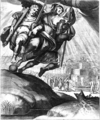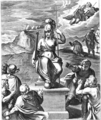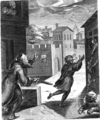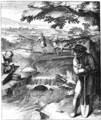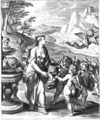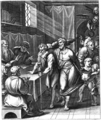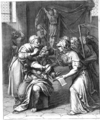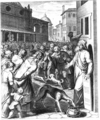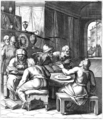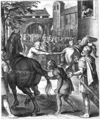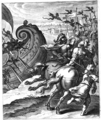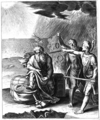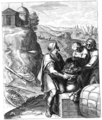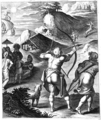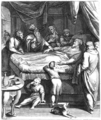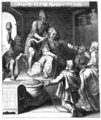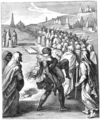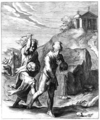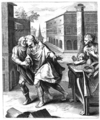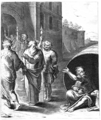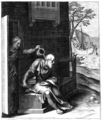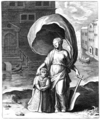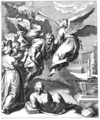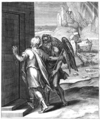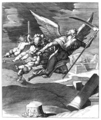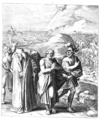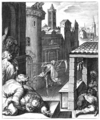A musis tranqvillitas. [75]
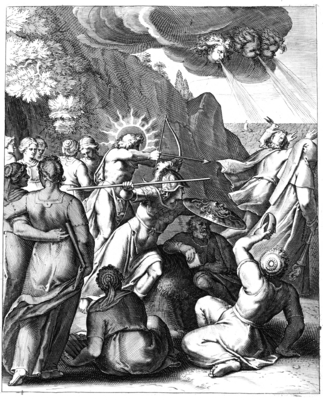
A MVSIS TRANQVILLITAS.
Pallas y Apollo, consu escudo, y flechas
Para los vicios, libre de passiones,
Guardan al sabio, haziendo, que derechas
El temor, la tristeza, y pretensiones
Por supoder y braço ya deshechas
Sin dar lugar, ò tiempo à sus razones,
Vayan al mar, que con su mal secebe,
Y sop la el viento porque el mar las lleue.
Para los vicios, libre de passiones,
Guardan al sabio, haziendo, que derechas
El temor, la tristeza, y pretensiones
Por supoder y braço ya deshechas
Sin dar lugar, ò tiempo à sus razones,
Vayan al mar, que con su mal secebe,
Y sop la el viento porque el mar las lleue.
Den vrient der Musen blijft altijt
Van droefheyt en van vrees' beurijt /
Voor Pallas grouwlijck schilt sy swichten /
Het welck hem deckt / maer hen versaeght.
Apollo met sijn snelle schichten
In zee hen met de winden iaeght.
Gheleertheyt kan de menschen gheuen
Een vrolijck en gherustlijck leuen.
Van droefheyt en van vrees' beurijt /
Voor Pallas grouwlijck schilt sy swichten /
Het welck hem deckt / maer hen versaeght.
Apollo met sijn snelle schichten
In zee hen met de winden iaeght.
Gheleertheyt kan de menschen gheuen
Een vrolijck en gherustlijck leuen.
Ad altro giogo, che al'amato canto,
L'amico à Muse non soppon' il collo.
Da se caccia il timor, la doglia, e'l pianto,
Di virtù. d'armonia vago, e sattollo.
E da le cure in preda à l'aure in tanto
Con l'aiuto di Pallade, e d'Apollo.
Ponno le Muse amiche alleggiar l'alma,
E por in bando ogni dogliosa salma.
L'amico à Muse non soppon' il collo.
Da se caccia il timor, la doglia, e'l pianto,
Di virtù. d'armonia vago, e sattollo.
E da le cure in preda à l'aure in tanto
Con l'aiuto di Pallade, e d'Apollo.
Ponno le Muse amiche alleggiar l'alma,
E por in bando ogni dogliosa salma.
L'amy des Muses ne s'empesche
De la Tristesse, & de la Peur:
Apollon à grand coup de flesche
Le garantit de leur rigueur.
Pallas par sa targue effroyable
Le couure, & si bien le defend
Que son cœur assailly du vent
De tout malheur reste immuable.
De la Tristesse, & de la Peur:
Apollon à grand coup de flesche
Le garantit de leur rigueur.
Pallas par sa targue effroyable
Le couure, & si bien le defend
Que son cœur assailly du vent
De tout malheur reste immuable.
Des neuf Muses cheri, libre de maladie
Je veux letter aux vents en soufle impetueux
La tristesse, & la crainte, & le soing enuieux,
Pour le rendre au dela de la mer de Candie.
Je veux letter aux vents en soufle impetueux
La tristesse, & la crainte, & le soing enuieux,
Pour le rendre au dela de la mer de Candie.
Translations
Literature
-
This emblem proclaims the eternity of the poet's fame and acknowledges the intercession of the Muses. Horace (quoted
by Vaenius) affirmes that 'the Muse forbids the man worthy of praise to die; the Muse blesses him with the reward of heaven.'Clements, The Cult of the Poet
 , pp. 673-675
, pp. 673-675
Sources and parallels
References, across this site, to this page:
No references to this emblem or page found.Iconclass
- rays as nimbus
[22C3114]

- rodents: hare (+ animals as attributes)
[25F26(HARE)(+13)]

- rocky coast
[25H131]

- storm
[26C3]

- head (human)
[31A221]

- sitting on the ground
[31A2351]

- arm stretched forward (+ protecting)
[31A2512(+9161)]

- sitting on the ground - AA - female human figure
[31AA2351]

- cheeks rounded
[31B6241]

- child
[31D112]

- adult man
[31D14]

- adult woman
[31D15]

- torch - BB - torch held upside down
[41BB32]

- mask
[41D283]

- putting the enemy to flight (+ variant)
[45H4(+0)]

- sailing-ship, sailing-boat
[46C24]

- panpipes
[48C7353]

- reading
[49N]

- Protection; 'Custodia', 'Difesa contra nimici, malefici & venefici', 'Difesa contra pericoli', 'Riparo da i tradimenti' (Ripa)
(+ emblematical representation of concept)
[54E42(+4)]

- Pain, Sorrow, Sadness; 'Dolore', 'Dolore di Zeusi' (Ripa) (+ clothed)
[56BB1(+113)]

- Confidence, Security, Tranquillity; 'Confidenza', 'Sicurezza e Tranquillité', 'Sicurté', 'Sicurté o Sicurezza', 'Tranquillité'
(Ripa) (+ emblematical representation of concept)
[56D3(+4)]

- Fear, Dread; 'Paura', 'Timidité o Timore', 'Timore' (Ripa) (+ clothed)
[56DD1(+123)]

- proverbs, sayings, etc. (with TEXT)
[86(A MUSIS TRANQUILLITAS)]

- specific aspects, allegorical aspects of Apollo; Apollo as patron
[92B37]

- Apollo as sun-god, i.e. Sol (Helius), Titan
[92B371]

- Apollo and the Muses, Apollo Musagetes (+ variant)
[92B3731(+0)]

- attributes of Apollo (with NAME)
[92B38(BOW AND ARROW)]

- Minerva as patroness
[92C271]

- attributes of Minerva (with NAME)
[92C28(HELMET)]

- attributes of Minerva (with NAME)
[92C28(LANCE)]

- Aegis: shield with Gorgon's head (attribute of Minerva)
[92C281]

![[H O M E : Emblem Project Utrecht]](/static/images/rd-small.gif)







